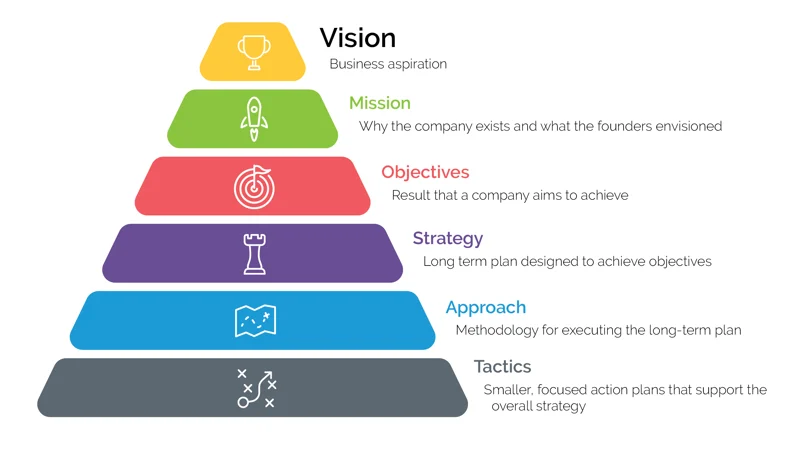Power of Business Strategy : In today’s fiercely competitive and rapidly evolving business landscape, organizations need a well-defined roadmap to navigate through uncertainty and achieve sustainable success. This roadmap is none other than a robust business strategy. A business strategy serves as a blueprint that aligns an organization’s goals, resources, and actions to drive growth, profitability, and market advantage. In this article, we will delve into the importance of business strategy, explore key elements, and highlight successful strategies employed by leading companies.
I. Understanding Business Strategy:
At its core, a business strategy is a comprehensive plan that outlines how an organization will achieve its long-term objectives. It involves making strategic choices about target markets, value propositions, competitive positioning, and resource allocation. A well-crafted strategy provides clarity and direction, guiding decision-making across all levels of the organization.
Read This: Network Marketing in Hindi 2023
II. Elements of an Effective Business Strategy:

1. Vision and Mission:
A clear and inspiring vision and mission statement lay the foundation for a successful business strategy. These statements define the purpose and direction of the organization, serving as a rallying point for employees, customers, and stakeholders.
2. Market Analysis:
A thorough understanding of the target market, customer needs, and industry trends is essential for developing a successful business strategy. Market analysis helps identify opportunities, assess competition, and tailor value propositions to meet customer demands.
3. Competitive Advantage:
A business strategy should identify and leverage the organization’s competitive advantage. This can be achieved through differentiation, cost leadership, innovation, or a combination of factors that set the company apart from competitors.
4. Goal Setting:
Setting clear and measurable goals is crucial for tracking progress and evaluating the success of a business strategy. Goals should be specific, achievable, and aligned with the overall strategic direction.
5. Resource Allocation:
Effective resource allocation is a critical aspect of business strategy. Allocating resources wisely ensures optimal utilization and enables the organization to pursue strategic initiatives effectively.
6. Implementation Plan:
A well-defined implementation plan outlines the actions required to execute the strategy successfully. It includes timelines, responsibilities, and key performance indicators to monitor progress and make necessary adjustments.
Read This: Housewife Business ideas in Hindi
III. Successful Business Strategies:

1. Apple Inc. – Differentiation Strategy:
Apple’s business strategy revolves around product differentiation and innovation. By creating aesthetically appealing, user-friendly devices coupled with a seamless ecosystem, Apple has captured a loyal customer base and maintained a premium position in the market.
2. Amazon.com – Customer Centricity:
Amazon’s relentless focus on customer satisfaction has propelled its success. Through personalized recommendations, fast delivery, and a wide product range, Amazon has become the go-to online retailer, continuously raising the bar for customer experience.
3. Southwest Airlines – Cost Leadership:
Southwest Airlines has adopted a cost leadership strategy, offering low fares while maintaining operational efficiency. By streamlining processes, minimizing overhead costs, and focusing on point-to-point routes, Southwest has become a formidable player in the airline industry.
4. Tesla – Disruptive Innovation:
Tesla’s business strategy centers on disruptive innovation in the electric vehicle market. By combining cutting-edge technology, superior performance, and sustainability, Tesla has revolutionized the industry and become a symbol of innovation.
Conclusion:
In today’s fast-paced and unpredictable business environment, having a well-crafted business strategy is essential for long-term success. A robust strategy enables organizations to adapt to changing market conditions, capitalize on opportunities, and stay ahead of the competition. By understanding the key elements of a business strategy and learning from successful examples, businesses can unlock their full potential and achieve sustainable growth in the dynamic marketplace. Remember, a strong strategy is not a one-time exercise but an ongoing process that requires continuous evaluation, adaptation, and innovation.

